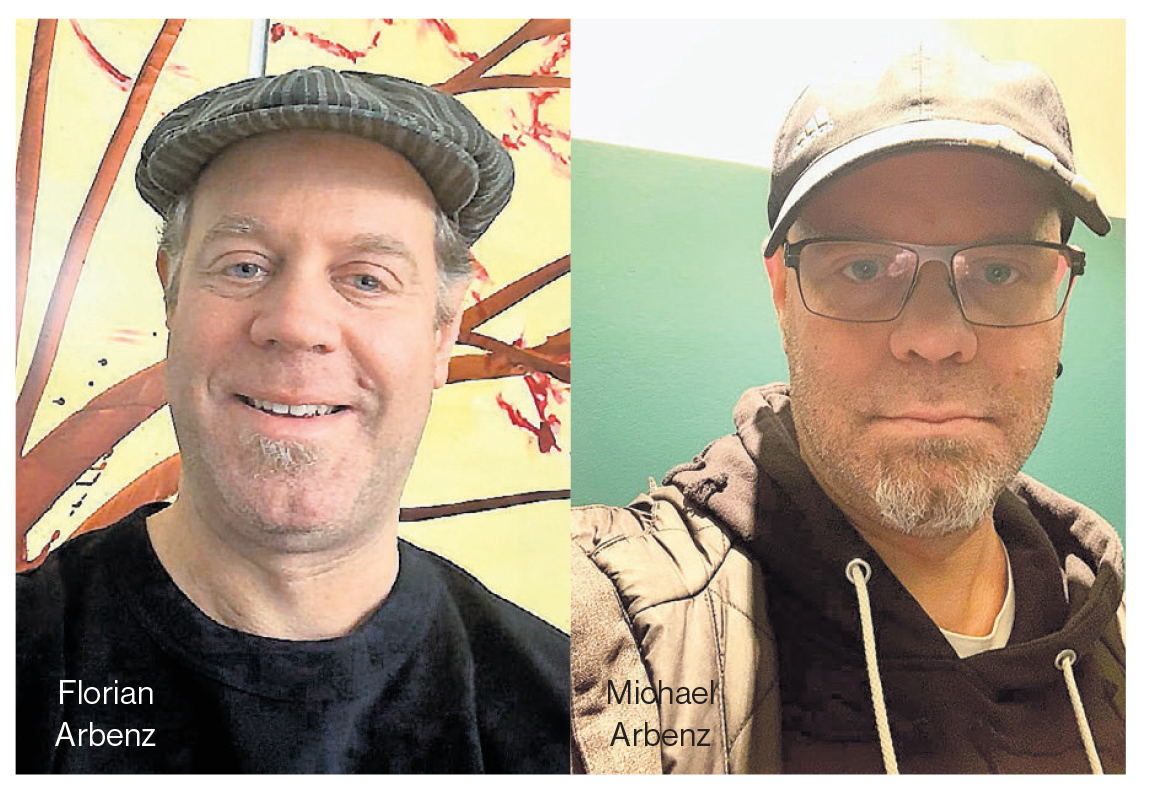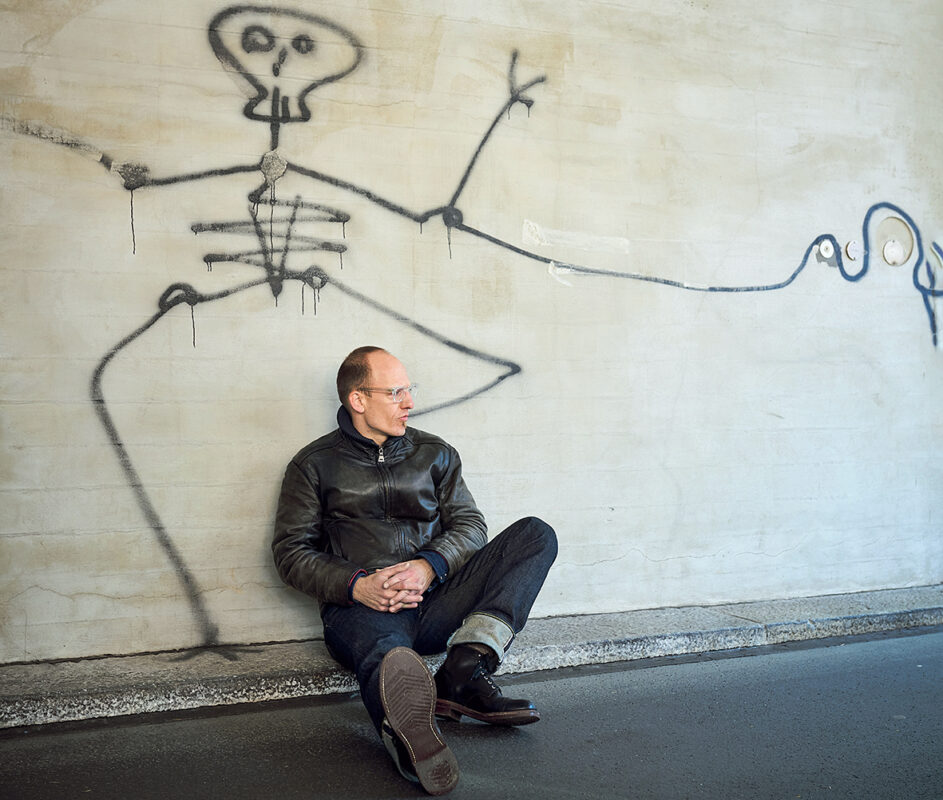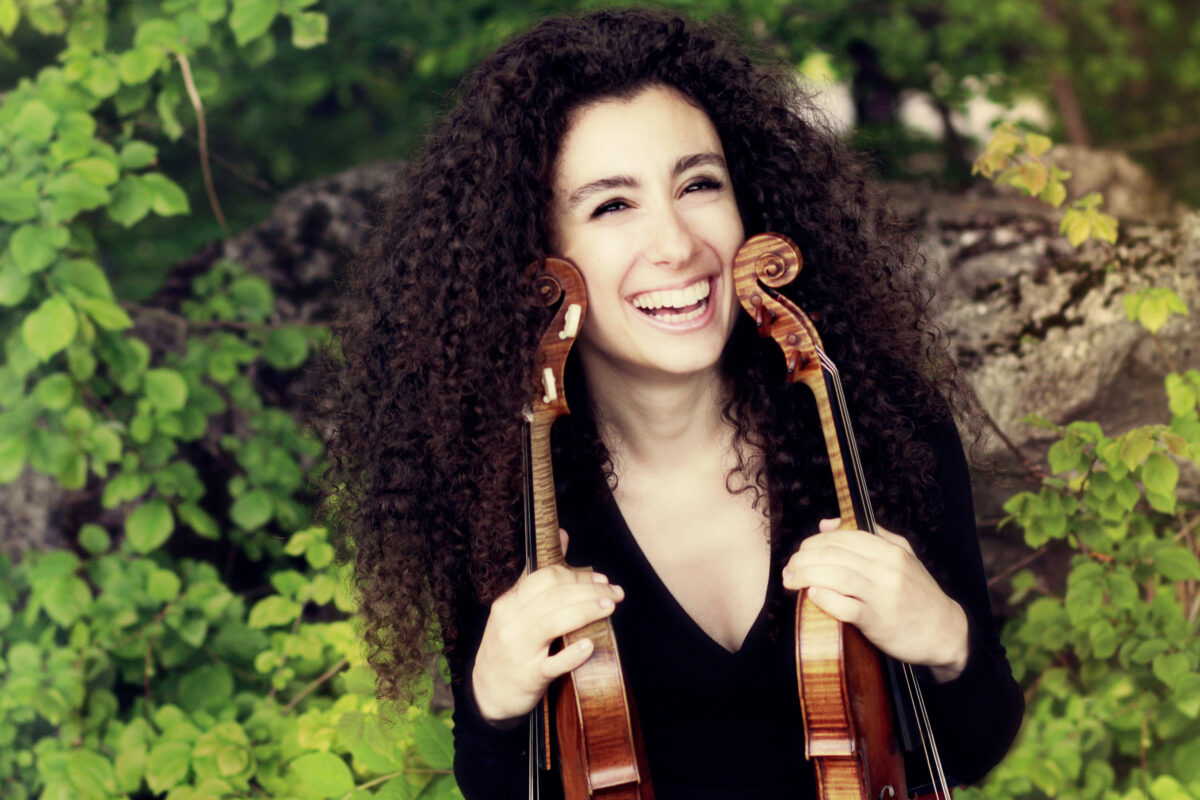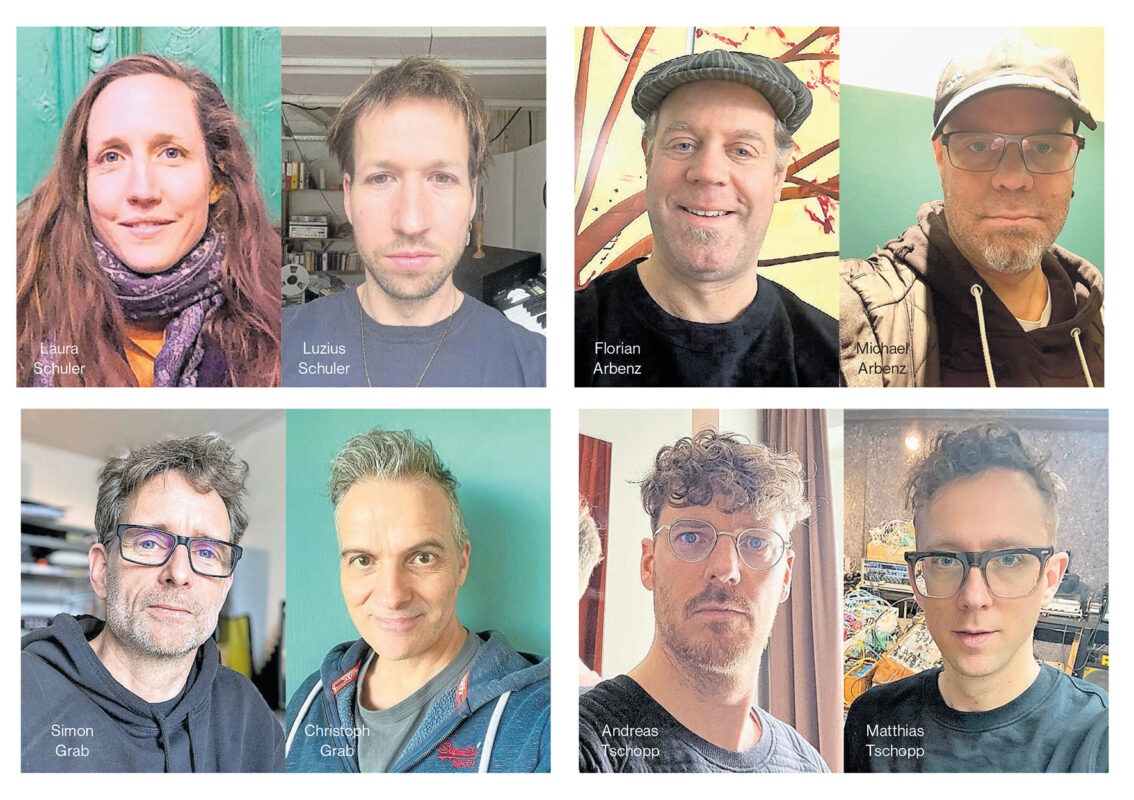Florian & Michael Arbenz
Twins, 1975, drums, piano

Hanspeter Künzler: How did you grow up?
MICHAEL Our parents were musicians, our mother was a cellist and had a lot to do with early musical education, our father was a pianist and director of the music school in Basel. So we grew up with music, especially classical music.
You couldn't have a more musical environment.
FLORIAN Yes, well, we were always around music, I would say. In terms of attitude, the mix was typical of our parents' generation. A humanist upbringing, growing up in the educated middle classes and a dash of hippie. Classically oriented, but always open-minded.
Hippie - you've also heard Jimi Hendrix?
FLORIAN Haha, it was just a shot of hippie - I'd say it stopped at the Cologne concert. No, they were very humanistically educated, played chamber music as children, Schumann and so on, and opened up to Django Reinhart and Keith Jarrett. But it didn't bother us. They were certainly a bit more open-minded than the generation before them, who took a more dogmatic view of things, I think.
MICHAEL There was enthusiasm for everything - light music from an earlier generation was also very present, the Comedian Harmonists, plus enthusiasm for groove and songs. My mother was very interested in the music of foreign peoples. African music in particular. She was enthusiastic about it and also had records.
When did you take music lessons?
MICHAEL Originally, we had piano lessons with our father from time to time. You kind of grew into it. I can't remember a starting shot.
FLORIAN Yes, I remember. In kindergarten at Christmas, the question came up: Who can offer something? I thought: My father plays the piano, so of course I can do that too. I came home, said I'd play something - and somehow it was clear that, if anything, we'd play something together. My parents' jaws dropped, they really didn't need that, but they humbly accepted it. That was perhaps the starting signal. I would say that a lot of it was their own doing. The parents were rather defensive, not in terms of quality, but in terms of pushing things along. We often said: we want to, and they supported us generously.
What do they think of the music you're making now?
MICHAEL I don't want to insinuate anything, but I do believe that our music today has parameters that can also appeal to people with a classical background, a certain aspiration to be reasonably well constructed, reasonably virtuosic, certain skills, a certain musicality. I think they can do a lot with that. If we made shallow pop, they probably wouldn't be able to do as much with it. Our music, even if it sounds different, still has a close connection to the aesthetics of classical music. They always come and they always love it.
FLORIAN Ever since I can remember, we had a room together as twins, made music together, it was always part of life and of the communication between us. There were always lots of instruments. We always used them too, like toys.
Even a drum kit?
FLORIAN Haha, they were rather skeptical about it at first. But there were always bits and pieces lying around. There were all sorts of things, accordions, balalaikas, banjos, we just picked them up and tried them out. You can also put together drums from other things. No, you can't say that I played drums out of rebellion.
What did you play together as 10-year-olds?
FLORIAN We were always jazz freaks. Our parents had a small collection that ranged between Louis Armstrong, Ella Fitzgerald and Django Reinhart, the most modern of which was probably Bill Evans. We've always loved it since we were little kids. It really appealed to us. We probably made music in that style, even if we didn't have any basic knowledge of it.
MICHAEL The other thing I can remember: We went to lessons at music school. I was still playing the drums at the time. There were various ways to learn something there, in addition to trying things out at home. In jazz, that's still my basis, picking things up by ear and feeling. When I think back, I understood things emotionally long before I realized what was happening. Learning by doing, before I understood intellectually. We both played piano and drums, which also gave the whole thing a slightly official grounding.
So you were already improvising back then?
FLORIAN It was like playing with instruments instead of building blocks.
MICHAEL We were like reenacting the history of jazz. The first thing we were enthusiastic about was Louis Armstrong and the 20s. New Orleans stuff, Benny Goodman, Fats Waller. Then it just worked itself out. My parents were in a record club. A new record came in the post every month. Bill Evans used to prank me. It was so different! It was a natural development that we imitated, following history.
FLORIAN We always had classical lessons, never jazz lessons. That didn't really exist back then. Our piano teacher was very open, her husband Gerald Bennett wrote new music and was a composer. She was extremely open, but she had nothing to do with jazz. Our drum teacher was a jazz freak and supplied us with cassettes up to Threadgill, Elvin, Miles, but he wasn't really a set player himself, we practiced classically
Weren't you seen as freaks at school with your jazz, when pop and rock were so exciting for many at the time?
MICHAEL Nena was very popular, Erste Allgemeine Verunsicherung - I found everything else relatively boring. Michael Jackson had more to do with jazz again. What we didn't get to hear as a child, for a relatively long time, was Jimi Hendrix and James Brown. The R&B scene wasn't present at all. Because we played jazz history, it came onto our radar relatively late ... We were able to get enthusiastic about the 60s relatively quickly. I can remember when you, Florian, with Agharta when Miles Davis came home, a completely different world opened up with the groove. We were 15 or so by then. We discovered it all ourselves, nothing was brought to us from outside.
Even today, intuitive understanding helps me ten times more than explaining everything to myself theoretically. I also think it's an extremely good approach for memorizing and transposing. I also try to teach this to my students.
How old were you when you started playing together in an organized way?
MICHAEL At 16 or so. We used to have a school band, it developed out of that. We were always looking for a bass for a long time, we always needed one, but that was a problem. We had a very intuitive, unschool-like approach, maybe that's why we didn't have blinkers on, but there were certain things we didn't know or weren't able to do. At that time, when we were 17 or 18, the first institutionalized jazz school generation came to Basel. They thought we were almost too weird because they were in the school thing. We went to Tibor Elekes' music workshop, he had a workshop like that, it was a place where we got input. In the end, we formed the first trio with a classical bass player who played jazz and was freaky enough to play with us. That became the New Jazz Trio.
How long did New Jazz Trio last?
FLORIAN Our first tour with Greg Osby was in 1998 or so. Thomas then joined us in 2000.
MICHAEL The new jazz trio NJT was the trio with whom we made the first CD, which I don't want to listen to anymore, but it was a milestone. It was also the trio with whom we did the first longer tour, with Greg Osby, the trio with whom we started traveling, that was kind of the starting point. When I listen to it today, I still see a lot of extreme freedom. Because the ideas came from us and nobody told us: you can't do that. I find that fascinating today. On the other hand, there are things that are missing, that nobody taught us.
When I think about it, in the 90s this very strong movement dominated, Marsalis and pianists like Marcus Roberts, they were very traditionalist. I have always explicitly distanced myself from that. For me, individual expression always comes first. That was much more important to me back then than playing stuff. Maybe I resisted that too much back then. But that could perhaps be seen as a kind of rebellious attitude.
Are there differences in the musical attitude between the two of you?
FLORIAN Perhaps the longer the more! It's also logical. When you grow up together and are always at the same stage, there's a certain synchronization. We moved out early, which led to different experiences and impressions.
MICHAEL It probably also has to do with the instrument. For me, if I can do something really well, it gives me freedom. I like to spend a long time with something before I can express myself freely. What I perhaps lack a little today is a certain basis in history that I can't fall back on, but always have to acquire anew. That can also be seen as a positive thing, that you develop a new approach to each piece and don't just replay the same thing over and over again. I started with the Band Vein In the last few years I have also arranged a lot, which probably has to do with the instrument, the piano with the orchestral approach.
The desire to keep looking for new constellations, not to rewind the same thing, is also evident in your series "Conversations", Florian, where you work with new casts every time.
FLORIAN Exactly. Yes.
Will there be another Vein album?
FLORIAN There's a bit of a standstill at the moment. A pause phase.
Have you always been in agreement within Vein? Are there ever arguments about musical issues?
MICHAEL All the time, actually. Right from the start, we never really agree. It's always a very exhausting process. But it's also a grindstone. Very rarely was it the case that one person said, let's do it this way, and the other said: great. It's a long process. But over time it is very fruitful, a lot of things emerge. And in the end we were still able to come to an agreement. A grassroots democratic Swiss band, if you like.
Do you know the novel by Michel Touriner, "Twin Stars"? It's about a twin who wants nothing more than to be close to his brother. He, in turn, wants to be as far away from his brother as possible. But the situation doesn't seem so drastic for you?
FLORIAN No, I don't know the novel. It's actually not that drastic with us. Vein has always been a band based on consensus. It has always taken a lot to reach consensus. That's also the reason why we feel like we need to take a break. That's why something like "Conversations" is a good thing, it's a breath of fresh air ...
What are your plans and projects?
MICHAEL Another solo album will be released in March. This will be followed by a tour, partly as a duo with Andy Sheppard. A project with a symphony orchestra will follow in May, let's see what happens there. There are various things waiting in the wings
FLORIAN The "Conversations" project is nearing completion. Now certain formations are ready to play. As far as we're concerned, we always had phases in between that we needed to clear our heads. Then you come back with fresh ideas and it's fun, and you have other inputs that you can bring into the collaboration. With us, it was always the case that we worked intensively and then had the feeling that we needed some air. In a way, you know each other so well that it's good to be able to bring outside inspiration into a project. I think that's important.
When you played with Greg Osby, you were still very young. How did that come about?
MICHAEL We heard him in New York and then wrote him a letter the old-fashioned way and enclosed a CD. Back then it was still by fax. The fax rattled again at 4 a.m. every morning. I think he was attracted by our otherness and our relaxed attitude. Today I still give him a lot of credit for that, he was a very established player back then. He probably didn't even realize that we were still at the beginning.
And Andy Sheppard? You've played with him before. Your connection with England is quite close. What are you particularly interested in?
FLORIAN I still think that England has a special approach that I find extremely appealing. It's relaxed. Kenny Wheeler, John Taylor, all the musicians in London who shaped the scene, it's a different relationship than just looking up to Miles, a different approach.
MICHAEL Andy Sheppard is old-school on the road. If he likes it, he does it. For me, he also sounds different from everyone else of his generation, and very un-American. It makes sense to me why Carla Bley asked him to play in her quartet.
How do you feel about the current English jazz generation, Comet is Coming and all that?
FLORIAN For me, it's a bit about attitude. There are people like Amy Churchill. When I asked her, she was immediately super happy to be involved, even if it's not clear what will come of it. On the other hand, there's Theon Cross, who I asked for "Conversations", I had his private email, but he doesn't even open my email.
In the scene, they look madly at it: Is it in our vibe or not, and if it's not, then they're not interested. There are those for whom it's important to be respected in their community, and others who are more interested in the artistic side. I also asked Oren Marshall and he said yes within two minutes. It's funny to see how different the mentality is. Sometimes it's not so easy to get in touch with musicians from younger generations.
Is there anything else to say about siblings?
MICHAEL I do have the feeling that when you start to build stuff up and are confronted with a lot of resistance, you have more of a boost with two people. You can split things up, which is certainly not a disadvantage.
What are you listening to right now? Hot tips?
FLORIAN I check out a lot of stuff, anything that catches my eye.
MICHAEL There are always things from the students at the university, so I get great input from the younger generation, things that I wouldn't otherwise know. The other thing: We have a history with classical contemporary music, with complex things, and I'm noticing more and more: the emotional value of listening to something like this for "fun", the emotional component, is becoming more and more important. I'm realizing that in my development I'm moving away from more cerebral stuff.








